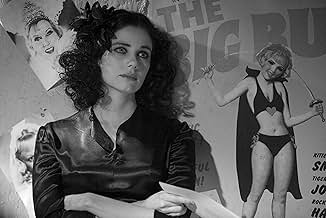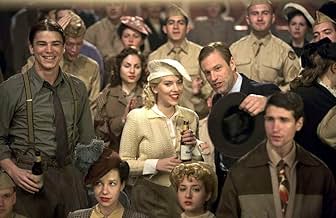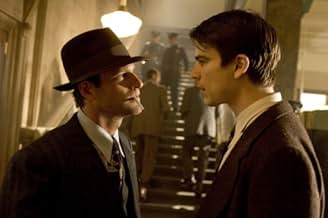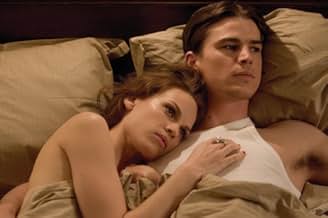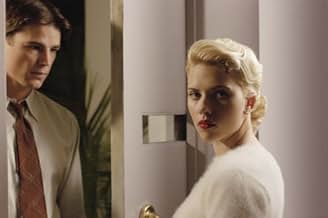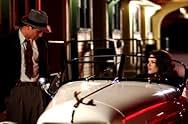Due poliziotti vedono la loro vita personale e professionale andare in frantumi in seguito alle indagini sull'omicidio di Elizabeth Short, la "Dalia Nera".Due poliziotti vedono la loro vita personale e professionale andare in frantumi in seguito alle indagini sull'omicidio di Elizabeth Short, la "Dalia Nera".Due poliziotti vedono la loro vita personale e professionale andare in frantumi in seguito alle indagini sull'omicidio di Elizabeth Short, la "Dalia Nera".
- Regia
- Sceneggiatura
- Star
- Candidato a 1 Oscar
- 4 vittorie e 16 candidature totali
Angus MacInnes
- Capt. John Tierney
- (as Angus MacInnis)
Recensioni in evidenza
Have you ever been with a master storyteller who is hot? I mean in person. Its an absolutely captivating thing, watching the craft of captivating you. Its a worthy experience, even when the story isn't good. In fact, its even better when they story isn't good. You might wonder for a while why such a talented teller would choose the material she has, but will fade as you fall under spell of the storyteller, undistracted by the story. It you are lucky, she'll be a hand dancer and you will simply allow your soul to move with the undermusic.
dePalma never bothers me when he chooses bad actors, stories and such. Its just not relevant to what he has to offer, and in fact sometimes I'm thankful that the story itself doesn't get in the way. "Mission to Mars" was rewarmed tacos, but the fact that it was served by a metaphoric, genuine Spanish grandmother from her own hands was all that mattered.
About 22 minutes into this there is a wonderful crane shot, probably done without artificial assistance, beginning five minutes which is the heart of the overly complex story. It sets up two apparently unrelated threads in the story that interweave from this point. It is of the front of a building where later there will be a shooting, moves up and over the building to look at a vacant lot behind where we see a woman making a gruesome discovery. She runs to the street alongside the building where we see the car of our two cops coming to park in front and engage in a shooting. We move in front of the car to a bicyclist, who plays no role in the story. He brings us to a couple walking down the sidewalk approaching the front of the building where they will encounter our cops. We come down to street height and listen in on their conversation.
Its masterful. Even if you think everything that follows is a mess, its a glorious mess made glorious by our setting of the knitting needles.
This, my friends, is what noir is about these days: establishing an eye of god who both is us and who perturbs nature to suit conventions of coincidence in storytelling.
But there's another joy here too. The story no surprise features a film within the film. Its the whole story, there, with elements of that internal film overlapping the main story in three or four significant ways. The star of this inner film, who also is our bisected victim is a character played by Mia Kirshner. She's so much more alive and real than anyone else in the main story, I can only assume it was deliberate and a truly thrilling risk. If you follow film, you'll know her very similar and hugely complex role in "Exotica," a landmark film.
Two major experiences in a film! Of course its worth watching!
Ted's Evaluation -- 3 of 3: Worth watching.
dePalma never bothers me when he chooses bad actors, stories and such. Its just not relevant to what he has to offer, and in fact sometimes I'm thankful that the story itself doesn't get in the way. "Mission to Mars" was rewarmed tacos, but the fact that it was served by a metaphoric, genuine Spanish grandmother from her own hands was all that mattered.
About 22 minutes into this there is a wonderful crane shot, probably done without artificial assistance, beginning five minutes which is the heart of the overly complex story. It sets up two apparently unrelated threads in the story that interweave from this point. It is of the front of a building where later there will be a shooting, moves up and over the building to look at a vacant lot behind where we see a woman making a gruesome discovery. She runs to the street alongside the building where we see the car of our two cops coming to park in front and engage in a shooting. We move in front of the car to a bicyclist, who plays no role in the story. He brings us to a couple walking down the sidewalk approaching the front of the building where they will encounter our cops. We come down to street height and listen in on their conversation.
Its masterful. Even if you think everything that follows is a mess, its a glorious mess made glorious by our setting of the knitting needles.
This, my friends, is what noir is about these days: establishing an eye of god who both is us and who perturbs nature to suit conventions of coincidence in storytelling.
But there's another joy here too. The story no surprise features a film within the film. Its the whole story, there, with elements of that internal film overlapping the main story in three or four significant ways. The star of this inner film, who also is our bisected victim is a character played by Mia Kirshner. She's so much more alive and real than anyone else in the main story, I can only assume it was deliberate and a truly thrilling risk. If you follow film, you'll know her very similar and hugely complex role in "Exotica," a landmark film.
Two major experiences in a film! Of course its worth watching!
Ted's Evaluation -- 3 of 3: Worth watching.
"For murder, though it have no tongue, will speak/With most miraculous organ." Shakespeare's Hamlet
Murders are messy on the screen and in real life; screenplays about them can be chaotic and disjointed also. Such is the case with Black Dahlia, a film noir from Brian De Palma, a past master of the macabre and the complicated (Blow Out, Body Double). It has all the trappings of a first-rate detective novel (James Ellroy) made into a 1940's thriller with appropriately moody music of the soulful trumpet (Mark Isham), lush production design (Dante Ferretti), and equally impressive costuming (Jenny Beavan), all set in a timelessly seedy Los Angeles.
There's also the conflicted, sometimes dark hero detective (Josh Hartnett) and the sexy, dangerous femme fatale (Hilary Swank), accompanied by the questionably good voluptuary sex bomb (Scarlett Johansson). As if these noir troublemakers were not enough, writer Josh Friedman seemingly adapts Ellroy's every subplot, every story thread, as if each had to be accounted for in the best CSI tradition.
The original novel was based on aspiring actress Elizabeth Short's unsolved grizzly murder in 1947. After a considerably convoluted exposition, with plot lines rarely intersecting in a unified way, the film has the nerve to offer one of the most extensive denouements in film history, could be a half hour, with lengthy explanation of how all those ends tied together. Needless to say, anti climaxes abound in this last segment, leaving not only more confusion about the plot but also a desire to get back to The Big Sleep without sleeping, a state Black Dahlia threatened several times.
Hartnett's detective says, "Nothing stays buried forever. Nothing." I say this weak noir wannabe should stay buried until a bright 22nd century scholar sees its cultural and aesthetic significance. Until then, it's a jumble of plot points resolved in the end by tedious narration. Even Scarlett Johansson's pulchritude couldn't win me, and that's murder in the first degree.
Murders are messy on the screen and in real life; screenplays about them can be chaotic and disjointed also. Such is the case with Black Dahlia, a film noir from Brian De Palma, a past master of the macabre and the complicated (Blow Out, Body Double). It has all the trappings of a first-rate detective novel (James Ellroy) made into a 1940's thriller with appropriately moody music of the soulful trumpet (Mark Isham), lush production design (Dante Ferretti), and equally impressive costuming (Jenny Beavan), all set in a timelessly seedy Los Angeles.
There's also the conflicted, sometimes dark hero detective (Josh Hartnett) and the sexy, dangerous femme fatale (Hilary Swank), accompanied by the questionably good voluptuary sex bomb (Scarlett Johansson). As if these noir troublemakers were not enough, writer Josh Friedman seemingly adapts Ellroy's every subplot, every story thread, as if each had to be accounted for in the best CSI tradition.
The original novel was based on aspiring actress Elizabeth Short's unsolved grizzly murder in 1947. After a considerably convoluted exposition, with plot lines rarely intersecting in a unified way, the film has the nerve to offer one of the most extensive denouements in film history, could be a half hour, with lengthy explanation of how all those ends tied together. Needless to say, anti climaxes abound in this last segment, leaving not only more confusion about the plot but also a desire to get back to The Big Sleep without sleeping, a state Black Dahlia threatened several times.
Hartnett's detective says, "Nothing stays buried forever. Nothing." I say this weak noir wannabe should stay buried until a bright 22nd century scholar sees its cultural and aesthetic significance. Until then, it's a jumble of plot points resolved in the end by tedious narration. Even Scarlett Johansson's pulchritude couldn't win me, and that's murder in the first degree.
Dante Ferretti's set design beautifully evokes the 1940's; Vilmos Zsigmond's cinematography enhances the period look; and the voice-over narration has been pulled from film-noir classics. While Brian De Palma's "The Black Dahlia" has much of the look and feel of Curtis Hanson's 1997 "L.A. Confidential," that far superior film boasted better performances and a well-written screenplay. Although both films were based on James Ellroy novels and both had complicated, involved plots, the Hanson film came together with satisfying logic. Unfortunately, De Palma's movie is equally if not more complex and leaves a few threads dangling or at least badly frayed.
Although loosely based on a famous Hollywood murder, "The Black Dahlia" spends more time than necessary in establishing the three-way partnership, if not ménage, between Josh Hartnett, Scarlett Johansson, and Aaron Eckhart. The leisurely pace allows viewers to ponder the last time that they saw a film with so many double letters in the stars' names. The trailer, which has played in theaters for weeks, was misleading, and the actual murder and resulting investigation do not begin until well into the film after we have witnessed boxing scenes between the police investigators, Hartnett and Eckhart, and some three-way flirtations that do little to advance the proceedings.
The film only becomes interesting when the campy upper crust Linscott family enters. Hilary Swank as Madeleine Linscott is a deadly femme in black and as fatale as they come. Fiona Shaw as her mother shamelessly steals scenes and chews the banisters in her few minutes on screen, and John Kavanagh as Emmet Linscott adds to the family's quirky personality. An entire film could have been constructed around the Linscotts that would have been far more interesting than the Hartnett-Johansson-Eckhart romance. Scarlett has little to do but purse her luscious red lips and look desirable in tight blouses, which she does quite well. Josh is all squinty-eyed intensity and muscled charm, which he does quite well. Aaron tries for more, but goes a bit over the top; perhaps he would have been more comfortable playing a cousin of the Linscotts.
Although "The Black Dahlia" is not the worst way to spend two hours, the film's pedigree would lead viewers to expect more. Only a week after the less-disappointing "Hollywoodland," De Palma's take on another old Hollywood mystery should have been riveting. All of the essentials were there, except possibly a seasoned troop of stars, for another "L.A. Confidential." Unfortunately, what arrived was a nearly indecipherable mystery within a tedious love triangle that was wrapped in multi-million dollar production values.
Although loosely based on a famous Hollywood murder, "The Black Dahlia" spends more time than necessary in establishing the three-way partnership, if not ménage, between Josh Hartnett, Scarlett Johansson, and Aaron Eckhart. The leisurely pace allows viewers to ponder the last time that they saw a film with so many double letters in the stars' names. The trailer, which has played in theaters for weeks, was misleading, and the actual murder and resulting investigation do not begin until well into the film after we have witnessed boxing scenes between the police investigators, Hartnett and Eckhart, and some three-way flirtations that do little to advance the proceedings.
The film only becomes interesting when the campy upper crust Linscott family enters. Hilary Swank as Madeleine Linscott is a deadly femme in black and as fatale as they come. Fiona Shaw as her mother shamelessly steals scenes and chews the banisters in her few minutes on screen, and John Kavanagh as Emmet Linscott adds to the family's quirky personality. An entire film could have been constructed around the Linscotts that would have been far more interesting than the Hartnett-Johansson-Eckhart romance. Scarlett has little to do but purse her luscious red lips and look desirable in tight blouses, which she does quite well. Josh is all squinty-eyed intensity and muscled charm, which he does quite well. Aaron tries for more, but goes a bit over the top; perhaps he would have been more comfortable playing a cousin of the Linscotts.
Although "The Black Dahlia" is not the worst way to spend two hours, the film's pedigree would lead viewers to expect more. Only a week after the less-disappointing "Hollywoodland," De Palma's take on another old Hollywood mystery should have been riveting. All of the essentials were there, except possibly a seasoned troop of stars, for another "L.A. Confidential." Unfortunately, what arrived was a nearly indecipherable mystery within a tedious love triangle that was wrapped in multi-million dollar production values.
Now I like Brian DePalma, and I love Carrie, The Untouchables and Carlito's Way. Out of the films of his I've seen, The Black Dahlia is my least favourite in my view, though I was also rather disappointed in Scarface too.
I was really interested in its concept and the story seemed interesting. Also the film is very well made, with stylish cinematography and beautiful scenery, costumes, sets and makeup, DePalma's direction has occasional flashes of brilliance and the music was quite nice as well.
However, this is another case of style over substance. The script falls flat, with little idea of which direction to go, and the tone of the story is also uneven with some scenes disappointingly over-the top. The characters I felt indifferent to, and I also thought they were quite shallow and poorly explored, the pace is rather meandering and with exception of Fiona Shaw who's quite good the acting is bland. Also the ending I think is overdone.
All in all, interesting initially and while well made it is emotionally hollow and flat in its scripting and characterisation. 4/10 Bethany Cox
I was really interested in its concept and the story seemed interesting. Also the film is very well made, with stylish cinematography and beautiful scenery, costumes, sets and makeup, DePalma's direction has occasional flashes of brilliance and the music was quite nice as well.
However, this is another case of style over substance. The script falls flat, with little idea of which direction to go, and the tone of the story is also uneven with some scenes disappointingly over-the top. The characters I felt indifferent to, and I also thought they were quite shallow and poorly explored, the pace is rather meandering and with exception of Fiona Shaw who's quite good the acting is bland. Also the ending I think is overdone.
All in all, interesting initially and while well made it is emotionally hollow and flat in its scripting and characterisation. 4/10 Bethany Cox
I was disappointed in this film mainly because I love James Elroy's books and found that this film did not do it justice. The characters in the film became stereotypes or cardboard 40's characters. Scarlett Johannsen looked like a young Lana Turner on tranquilizers.........very little emotion, so much mumbling.............poor Hilary Swank was just too distracting in her black wig trying to be a 40's vamp ...........I guess we are not accustomed to seeing her that way and she evidently does not do well in sexy, seductive roles............Josh Hartnett did pretty well.........although the constant taking off of clothing of his different ladies seemed a bit tiresome......if I would have had this on video I would have fast forwarded the constant "clothes removal" scenes. James Ellroy also wrote LA Confidential and that was a masterpiece on film.........but of course, the actors were Russell Crowe, Kevin Spacey, Danny Divito, and many very well seasoned actors with a far above average script. Sorry to say that this film is not academy award material as LA Confidential was................Ellroy's stories can be told on film with good writing, competent acting, good casting, good screenplay and continuity. This was not present in The Black Dahlia. Actually, the girl who played The Black Dahlia was the most sensitive and sympathetic and portrayed her character excellently.
Lo sapevi?
- QuizWhen Dwight "Bucky" Bleichert goes searching through some photographs, you can see a real autopsy photo of Elizabeth Short.
- BlooperWhen Bucky Bleichert enters Sheryl Saddon's bedroom to get the suitcase, there is a postcard-sized picture of Bettie Page on the wall. Bettie Page did not start modeling until 1950.
- Citazioni
Emmet Linscott: What kind of name is Bleichert? Dutch?
Ofcr. Dwight "Bucky" Bleichert: German.
Emmet Linscott: Ah, a great people, the Germans. Hitler was a bit excessive. But mark my words that someday we'll regret not joining forces with him to fight the Reds.
- Colonne sonoreIn the Mood
Written by Joe Garland (as Joseph C. Garland)
Used by Permission of Shapiro Bernstein & Co. Inc. (ASCAP)
I più visti
Accedi per valutare e creare un elenco di titoli salvati per ottenere consigli personalizzati
Dettagli
- Data di uscita
- Paesi di origine
- Lingue
- Celebre anche come
- La Dalia Negra
- Luoghi delle riprese
- Aziende produttrici
- Vedi altri crediti dell’azienda su IMDbPro
Botteghino
- Budget
- 50.000.000 USD (previsto)
- Lordo Stati Uniti e Canada
- 22.545.080 USD
- Fine settimana di apertura Stati Uniti e Canada
- 10.005.895 USD
- 17 set 2006
- Lordo in tutto il mondo
- 49.332.692 USD
- Tempo di esecuzione2 ore 1 minuto
- Colore
- Mix di suoni
- Proporzioni
- 2.35 : 1
Contribuisci a questa pagina
Suggerisci una modifica o aggiungi i contenuti mancanti







